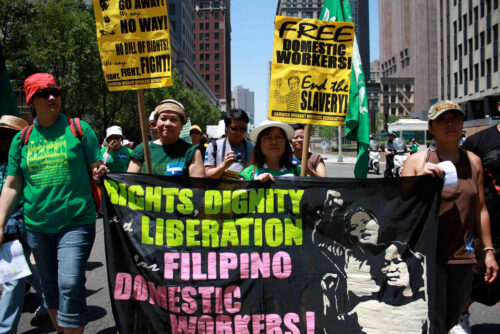Launching, sustaining, and strengthening campaigns that improve the working conditions of domestic workers has been an important component of uniting the NDWA’s member organizations. During the East Coast Regional Congress, campaign planning focused on the New York State Domestic Workers Bill of Rights, which would address the exclusion of domestic workers from basic labor protections, provide recognition for the workforce as a real workforce, and establish specific protections to address isolation, along with the vulnerability of domestic workers to abuse and mistreatment. The bill has national implications and is widely supported by the NDWA. Through the NDWA, organizations from all over the country are able to rally together and leverage collective power by supporting efforts to create New York State legislation.
Drawing inspiration and learning lessons from the NY State Domestic Workers Bill of Rights Campaign, member organizations in California are planning for a similar bill. At the Western Regional Congress, 200 workers, organizers, and advocates from 20 worker organizations and about 10 key ally organizations gathered for training, exchange, strategizing, relationship building, and visioning a national and international movement of domestic workers to obtain workplace and social justice. One of the highlights was the participation of many young domestic worker organizations and others just recently connected to the NDWA.
The NDWA workplan for 2010 is ambitious, including support for local efforts of member organizations, continuing to build the national infrastructure, and networking with other national grassroots alliances organizing in immigrant and working class communities, including the National Day Laborers Organizing Network, Grassroots Global Justice, Jobs with Justice, Right to the City Alliance, and Pushback Network, in order to have greater voice and influence with the current administration.
To expand its knowledge of the industry and the conditions of domestic workers nationally, the NDWA is launching a national participatory research project using member organizational surveys and a review of laws related to domestic work in each state with a member organization. The results may lead to longer-term campaign opportunities on the national level.
Also among its priorities in this period, the NDWA is organizing with domestic workers around the world to win a strong International Labor Organization (ILO) convention on domestic work, for standards and protections this workforce so desperately needs. The ILO is the organization that sets standards on international labor rights, and monitors how they are implemented. In June 2010 in Geneva, Switzerland, the ILO will debate and adopt an international standard setting of the rights of domestic workers, and the NDWA will attend in partnership with AFL-CIO. The NDWA’s participation represents an opportunity to take part in building an international movement of domestic workers.



